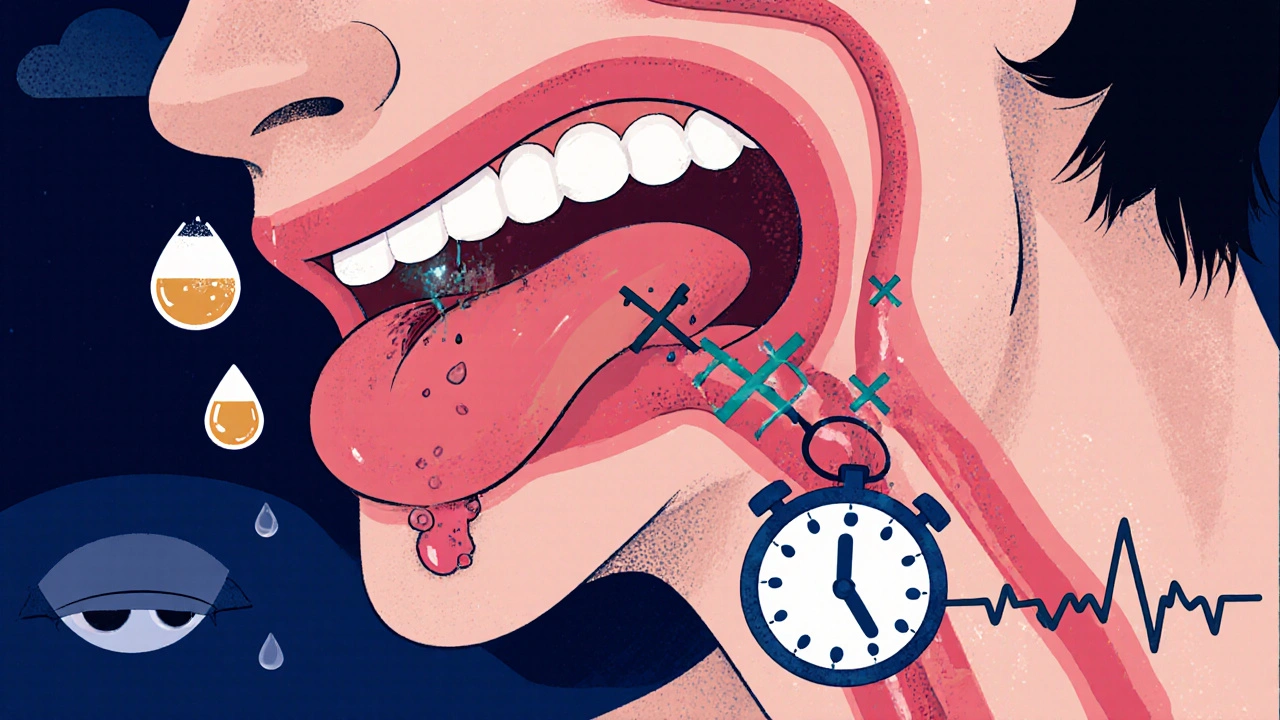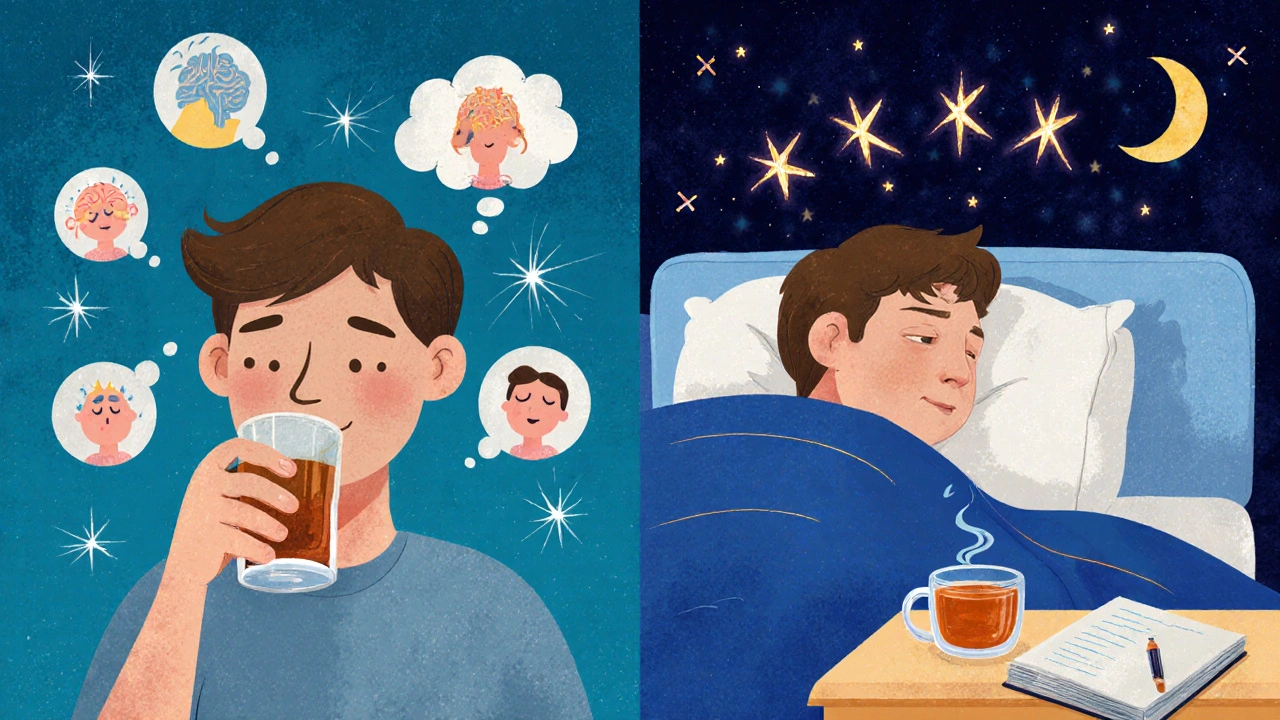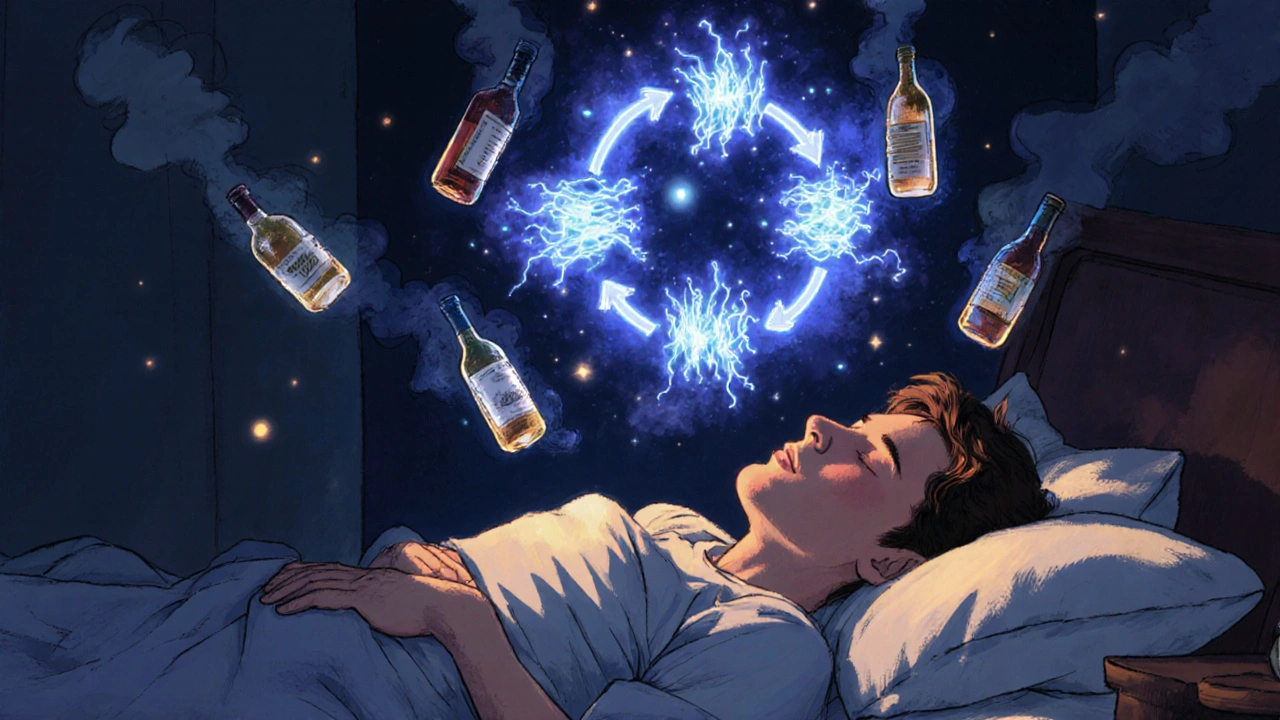Many people believe a nightcap helps them sleep better. It’s a common habit-wine with dinner, a beer after work, or a shot before bed to quiet the mind. But here’s the truth: alcohol doesn’t improve sleep. It sabotages it. And the damage doesn’t stop when you wake up.
How Alcohol Tricks Your Brain Into Thinking It’s Sleeping
Alcohol acts like a sedative. It slows down brain activity, which is why you feel drowsy after a few drinks. This makes it easier to fall asleep quickly. But that initial calm is an illusion. Your brain isn’t resting-it’s being chemically forced into a shallow, unnatural state.Studies show that within 30 to 60 minutes of drinking, alcohol increases deep sleep (N3) in the first half of the night. This might sound good, but it’s misleading. Deep sleep is restorative, yes-but when it’s forced by a drug, your brain doesn’t get to cycle naturally through all the stages it needs. The result? A distorted sleep architecture that crashes later.
As alcohol leaves your system-about one drink per hour-you hit a rebound effect. Your brain, which was suppressed, goes into overdrive. Adenosine, the chemical that naturally builds up during wakefulness to signal sleepiness, gets disrupted. Instead of a smooth transition into lighter sleep and REM, your brain fights to recover balance. That’s when fragmentation begins.
Sleep Fragmentation: The Silent Nighttime Saboteur
Sleep fragmentation means you’re waking up-often without remembering it-dozens of times a night. You might think you slept through the night, but your body was constantly shifting between light and wakeful states.Research from the National Sleep Foundation shows 67% of people who drink alcohol within two hours of bedtime report at least one nighttime awakening. Compare that to just 39% of non-drinkers. That’s more than double the disruption.
Polysomnography studies (the gold standard for sleep measurement) reveal that alcohol reduces REM sleep by up to 50% in the first half of the night. Then, as alcohol clears, REM rebounds-sometimes violently. This is why you might wake up drenched in sweat, heart racing, after a vivid nightmare. Your brain is trying to catch up on the REM it lost, but it’s doing so chaotically.
This pattern isn’t just annoying-it’s harmful. REM sleep is when your brain processes emotions, consolidates memories, and strengthens neural connections. Without enough of it, you’re more likely to feel anxious, irritable, or emotionally raw the next day. And over time, this cycle weakens your brain’s ability to regulate mood.
Alcohol and Sleep Apnea: A Dangerous Combo
If you snore or suspect you have sleep apnea, alcohol makes it worse. And if you don’t have it yet, alcohol can push you toward it.Alcohol relaxes the muscles in your throat. That’s fine during the day. At night, when you’re lying down and your airway is already more prone to collapse, that relaxation becomes a problem. Your tongue and soft palate can block your airway, causing pauses in breathing-sometimes for 10 seconds or more.
A 2021 study by the American Academy of Sleep Medicine found that each standard drink consumed before bed increases the apnea-hypopnea index (AHI)-a measure of breathing disruptions-by 20%. That means if you have mild sleep apnea and have two drinks, you could jump into moderate territory.
Heavy drinkers (five or more drinks) face a 51% higher risk of moderate-to-severe sleep apnea, according to a 2022 meta-analysis in the Chest Journal. The American Thoracic Society advises anyone with sleep apnea to avoid alcohol entirely within three hours of bedtime. Even one drink can drop your blood oxygen levels by 3-5%, putting extra strain on your heart and brain.

Next-Day Effects: You’re Not Just Tired-You’re Impaired
Most people think, “I got 7 hours of sleep. I’m fine.” But if alcohol was involved, you didn’t get restorative sleep.A 2023 clinical study found that even after consuming only moderate amounts of alcohol (0.85-1.0 g/kg), participants lost nearly 20 minutes of total sleep time and saw their sleep efficiency drop by 4.3%. Their heart rates stayed elevated through the night. And yet, when tested the next morning, many said they felt “normal.”
That’s the problem. Alcohol masks how badly you’re impaired. Cognitive performance dropped by 8.7%. Working memory shrank by 9.4%. Processing speed slowed by 12.7%. You might think you’re okay to drive, work, or make decisions-but your brain is running on fumes.
Emotional control takes a hit, too. A 2022 study from the University of Pittsburgh showed participants reacted with 31.2% more intensity to negative stimuli after drinking before bed. That means small frustrations feel like big crises. You’re more likely to snap at coworkers, overreact to texts, or feel overwhelmed by routine tasks.
And it gets worse over time. A 5-year study by the American Academy of Neurology found that people who regularly drank before bed experienced cognitive decline 23% faster than those who didn’t. That’s not just memory lapses-it’s accelerated aging of the brain.
The Vicious Cycle: When Sleep Loss Fuels More Drinking
Here’s the trap: when you wake up feeling tired, foggy, or emotionally raw after a night of drinking, your brain starts to associate alcohol with sleep. “I need it to calm down,” you tell yourself. “I can’t sleep without it.”But that’s backwards. Alcohol doesn’t help you sleep-it destroys your ability to sleep naturally. The University of Missouri found in mouse studies that after binge drinking, the brain’s natural sleep drive (adenosine signaling) gets impaired. The next night, you need more alcohol to feel the same sedative effect.
This is how dependence starts. Not with cravings at first, but with the quiet realization: “I can’t sleep the way I used to.” That’s when the cycle locks in. You drink to sleep. You sleep poorly. You drink more to fix it. And your brain slowly loses its ability to rest without chemicals.

Tolerance Isn’t Freedom-It’s a Warning
Some people say, “I’ve been drinking before bed for years. I’m used to it.” But tolerance doesn’t mean safety.After 3-7 days of regular alcohol use, your body adapts. The initial sedative effect fades. You need more to fall asleep. But the sleep disruption? That doesn’t go away. In fact, it gets worse. Your REM suppression stays, your apnea risk stays, your next-day fog stays.
A 2023 review in Sleep Medicine Reviews found that regular pre-bed alcohol use increases the risk of chronic insomnia by 38%. That’s not a small bump. That’s a major shift in your long-term health.
And for those recovering from alcohol use disorder, sleep problems can last for months. The National Institute on Alcohol Abuse and Alcoholism reports that 50-70% of people in early recovery struggle with severe insomnia. It can take 3-6 months for sleep architecture to return to normal-longer than most people expect.
What Should You Do Instead?
You don’t need alcohol to sleep. You need habits that support your body’s natural rhythm.- Stop drinking at least 3 hours before bed. Give your body time to metabolize it.
- Try magnesium-rich foods (like almonds, spinach, or bananas) or a warm cup of chamomile tea.
- Keep your bedroom cool, dark, and quiet. Use white noise if needed.
- Get sunlight in the morning. It helps regulate your circadian rhythm.
- If you’re stressed, try journaling for 10 minutes before bed. Write down what’s on your mind so your brain doesn’t have to race through it at night.
And if you suspect you have sleep apnea-snoring, gasping at night, waking up exhausted-get tested. No amount of alcohol is worth the risk to your breathing, your heart, or your brain.
Bottom Line: Alcohol Is a Sleep Thief
It doesn’t matter if it’s one drink or five. Alcohol doesn’t improve sleep. It steals the quality you can’t measure-deep rest, emotional balance, brain repair. It makes apnea worse. It fragments your night. It dulls your mind the next day. And over time, it rewires your brain to depend on it just to rest.You don’t need a nightcap. You need better sleep. And the best way to get it? Leave the alcohol off the table.
Does alcohol help you sleep better?
No. While alcohol may help you fall asleep faster, it disrupts sleep quality by reducing REM sleep, increasing nighttime awakenings, and worsening sleep apnea. Studies show even one drink reduces REM sleep by 9.3% and increases fragmentation by 11.7%. The initial drowsiness is misleading-it’s not restorative sleep.
How does alcohol affect sleep apnea?
Alcohol relaxes the muscles in your throat, making your airway more likely to collapse during sleep. Each standard drink before bed increases the apnea-hypopnea index (AHI) by 20%. Heavy drinkers (5+ drinks) face a 51% higher risk of moderate-to-severe sleep apnea. The American Thoracic Society recommends avoiding alcohol entirely within 3 hours of bedtime if you have sleep apnea.
Why do I wake up in the middle of the night after drinking?
As alcohol leaves your system (about one drink per hour), your brain rebounds from its sedated state. This causes increased arousal, lighter sleep, and REM rebound-leading to vivid dreams, nightmares, or sudden awakenings. You may not remember waking up, but your sleep is still fragmented. About 67% of people who drink before bed report nighttime awakenings.
Can alcohol cause insomnia?
Yes. Regular alcohol consumption before bed increases the risk of chronic insomnia by 38%, according to a 2023 review in Sleep Medicine Reviews. Even if you fall asleep easily, the disrupted sleep architecture and rebound wakefulness can lead to long-term difficulty staying asleep. Insomnia is also one of the strongest predictors of relapse in people recovering from alcohol use disorder.
How long does it take for sleep to improve after quitting alcohol?
For non-dependent individuals, sleep architecture begins improving within days, but full recovery can take 3-6 months. In people with alcohol use disorder, sleep disturbances are common during early abstinence, with 50-70% experiencing clinically significant insomnia. REM sleep and deep sleep cycles gradually normalize, but patience and consistent sleep hygiene are essential.
Does alcohol affect cognitive function the next day?
Yes. Even if you feel fine, your brain is impaired. A 2023 study found that after alcohol consumption, cognitive task performance dropped by 8.7%, working memory decreased by 9.4%, and processing speed slowed by 12.7%. Emotional reactivity also increased by 31.2%. These effects occur even when total sleep time appears normal.

Johnson Abraham
November 10, 2025 AT 20:55Shante Ajadeen
November 12, 2025 AT 13:13Arpita Shukla
November 13, 2025 AT 03:45Mark Rutkowski
November 13, 2025 AT 14:24Ryan Everhart
November 14, 2025 AT 16:41David Barry
November 15, 2025 AT 01:09Alex Ramos
November 15, 2025 AT 17:26Eve Miller
November 16, 2025 AT 05:03Benjamin Stöffler
November 17, 2025 AT 16:03Amie Wilde
November 18, 2025 AT 21:44Chrisna Bronkhorst
November 19, 2025 AT 22:23edgar popa
November 20, 2025 AT 14:56Nicole M
November 21, 2025 AT 15:53Alyssa Lopez
November 22, 2025 AT 16:30